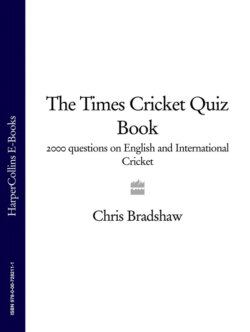Читать книгу The Times Cricket Quiz Book: 2000 questions on English and International Cricket - - Страница 2
Foreword
ОглавлениеI have been writing and talking about cricket for longer than I care to think (exactly how long is, happily, not one of the questions that follow) but I have to confess that I am hopeless at quizzes myself. If, for example, I know the answer in the general knowledge section of Mastermind, I am always beaten to the draw by the contestant; and when I see questions on paper that I ought to be able to answer with ease, my mind freezes as it used to when confronted by one of those school mathematics problems…If a man drives to Leicester at 48 miles per hour and Leicester is 24 miles distant, how long will it take him to arrive? Ugh. I can feel the blush on my cheeks still, even as pupils all around me put up their hands and said, ‘Sir, sir…oh, Sirrrr…’
But this book is different. Most of the questions are not too difficult, which is good, because people like to know the answers to some questions at least: it is good for their peace of mind. Many of the questions are admirably topical, which is not always the case with quizzes. There are enough sufficiently tricky ones to sort the serious scholars from the amateurs. There are a few multiple choice questions too, which always makes life easier. And they are all about cricket, not maths, or French, or the reason for the Great Atlantic Drift; or the formula for hydrogen; or the date of the battle of Agincourt. (I know that everyone knows that Agincourt was in 1415, but that’s not the point.)
Above all, this is the most wide-ranging cricket quiz book I have seen. It covers everything from the early days of international cricket to recent Twenty20 contests.
I have been able to give the questions only an overview so far, but I shall keep it by my bed in future. It will induce a satisfied sleep much more certainly than a crossword or one of those infuriating Su Doku puzzles.
Quiz books are, indeed, like anthologies, or favourite old films: they need to be looked at and enjoyed from time to time, when the mood is right and the brain is in tune; not dealt with in a single session like an exam. You can take as much or as little time as you wish over these gentle tests of your knowledge. And if you, too, put it on your bedside table, try to resist looking up the answer to something that is on the edge of your brain—at least until the morning. It may come to you at three in the morning and your sleep will be blissful after that.
Christopher Martin-Jenkins
